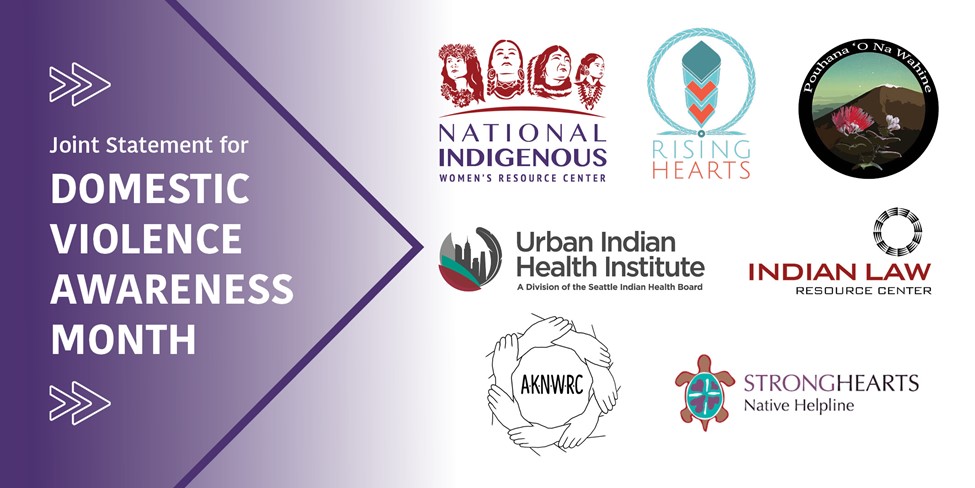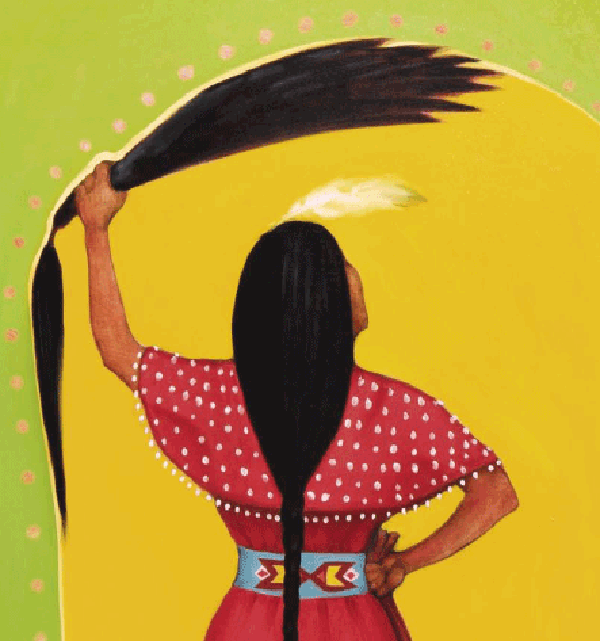October is Domestic Violence Awareness Month, highlighting a critical issue for American Indian and Alaska Native (AI/AN), and Native Hawaiian women who experience domestic violence at significantly higher rates than other women. According to the National Institute of Justice, more than 1.5 million American Indian and Alaska Native women and 1.4 million Native men have experienced violence in their lifetime, often by non-Indian perpetrators. According to a 2018 report by the Office on Hawaiian Affairs, the rate Native Hawaiian women experience violence is nearly twice as high as that of non-Hawaiian women.
We cannot stress this truth enough: domestic violence is not traditional to Indigenous cultures and is a lasting effect of colonization. Domestic violence happens when a person directs one or multiple types of fear-inducing abuse (ex. physical, emotional/verbal, sexual, financial, cultural, spiritual, or digital) toward a relative to maintain power and control. Intimate Partner Violence (IPV) is a form of domestic violence when a current or former spouse or intimate partner engages in a repetitive pattern of fear-inducing abuse toward their partner to maintain power and control in a relationship. This pattern of abuse can happen in relationships where couples are dating, married, living together, have a child together, or after the relationship has ended.
Research shows that the majority of intimate partner violence is perpetrated by men against women, though anyone can experience domestic violence or IPV in their relationships. Today, the legacy of colonization and oppression toward Native people continues to impose and promote the domination and ownership of Indigenous women by men, as reflected in the disproportionate rates of domestic violence and sexual violence against women seen throughout history since contact. This legacy of colonization also includes the forced removal of generations of Native children from their families who suffered abuse during their placement in federal boarding schools. Girls specifically suffered molestation, rape, pregnancies, and forced abortions, and murder while in these schools. This legacy of trauma is one of the most terrible truths about the violence against our people and has had devastating effects on families who had members who attended the schools or had children murdered at them. We believe these realities created the wake for the crisis levels of violence against Indigenous women and are now surfacing as proof for the ongoing violence against Indigenous people that continues today.
Violence against Indigenous women is preventable and will end when Indian Nations have the full authority of self-government, including authority over non-Indian perpetrators who commit this violence. In addition, Indigenous communities require adequate resources to support Native victim-survivors on their journey to healing. Indigenous people remain disproportionately impacted by violence with little to no access to lifesaving services and shelter due to the failure of the federal government to uphold its trust responsibility to assist Tribes and Native Hawaiians in maintaining safe and stable communities. Indigenous-based domestic violence shelters provide such critical advocacy–such as safety planning, resources, and support–to Native victim-survivors, yet there are only 58 Native domestic violence shelters nationwide for 574 Tribes, signaling an urgent, unmet need. This is especially concerning during the pandemic considering the need for social distancing inside public areas and the increase in domestic violence overall.
Tribal and Indigenous-based programs need access to critical, permanent funding to ensure our relatives have the necessary medical, healing, and comprehensive range of supportive services they desperately need. As Indigenous organizations, we recognize our responsibility as relatives to speak out against domestic violence and ensure the voices of survivors are honored and heard. Together we ask each of you to honor the needs of Indigenous victim-survivors of domestic violence by listening to, believing, and supporting them on their journey to healing this October for Domestic Violence Awareness Month.
###

About the National Indigenous Women’s Resource Center:
The National Indigenous Women’s Resource Center, Inc. (NIWRC) is a Native-led nonprofit organization dedicated to ending violence against Native women and children. NIWRC provides national leadership in ending gender-based violence in tribal communities by lifting up the collective voices of grassroots advocates and offering culturally grounded resources, technical assistance and training, and policy development to strengthen tribal sovereignty. niwrc.org
About StrongHearts Native Helpline:
StrongHearts Native Helpline was created by and built to serve Indigenous communities across the United States. It is a culturally-appropriate, anonymous, confidential and free service dedicated to serving Native American and Alaska Native survivors and concerned family members and friends affected by domestic, dating and sexual violence. Advocates are available 24/7 by texting or calling 1-844-7NATIVE (1-844-762-8483) or via online chat at strongheartshelpline.org. Connect with knowledgeable advocates who can provide lifesaving tools and immediate support to enable survivors to find safety and live lives free of abuse. StrongHearts Native Helpline is a proud partner of the National Indigenous Women’s Resource Center and the National Domestic Violence Hotline. Learn more at strongheartshelpline.org.
About the Alaska Native Women’s Resource Center:
Organized in 2015, the Alaska Native Women’s Resource Center (AKNWRC) is a tribal nonprofit organization dedicated to ending violence against women with Alaska’s 229 tribes and allied organizations. AKNWRC board members and staff are Alaska Native women raised in Alaska Native Villages and have over 250 years of combined experience in tribal governments, nonprofit management, domestic violence, and sexual assault advocacy (both individual crisis and systems and grassroots social change advocacy at the local, statewide, regional, national and international levels), and other social services experience. AKNWRC’s philosophy is that violence against women is rooted in the colonization of indigenous nations and thus dedicated to strengthening local, tribal government’s responses through community organizing efforts advocating for the safety of women and children in their communities and homes against domestic and sexual abuse and violence. aknwrc.org
About the Indian Law Resource Center:
Founded in 1978 by American Indians, the Indian Law Resource Center (ILRC) is a non-profit organization that provides legal assistance to indigenous peoples of the Americas to combat racism and oppression, to protect their lands and environment, to protect their cultures, to achieve sustainable economic development and genuine self-government, and to realize their other human rights. The ILRC’s Safe Women, Strong Nation’s project works with indigenous women’s organizations and Native nations to end violence against indigenous women. The ILRC is in consultative status with the UN Economic and Social Council. indianlaw.org
About Urban Indian Health Institute:
Urban Indian Health Institute (UIHI) is a division of Seattle Indian Health Board, is one of 12 Tribal Epidemiology Centers and the only one that serves Urban Indian Health Programs across the country. UIHI conducts research and evaluation, collects and analyzes data, and provides disease surveillance to strengthen the health of urban Native communities nationwide. UIHI focuses on the strengths of Native communities while addressing the health disparities they face. UIHI utilizes the best of western science but is rooted in Indigenous practices. They decolonize data, for Indigenous people, by Indigenous people. uihi.org
About Rising Hearts Coalition:
Rising Hearts is an Indigenous led grassroots organization committed to the heart work in elevating Indigenous voices and promoting and supporting intersectional, collaborative efforts across all movements with the goals of racial, social, climate and economic justice. Our primary focuses are to inform, elevate, mobilize and organize through strategic and targeted advocacy, and to establish collaborative partnerships to help create a better, safer future and environment for all relatives who inhabit this planet–past, present and future. risinghearts.org
About the Pouhana O Na Wahine:
The Pouhana O Na Wahine (PONW) is a grassroots organization focused on opening a Native Hawaiian Resource Center on Domestic Violence to reduce disparities faced by Native Hawaiians which dates back to the days of contact with foreigners resulting in the overthrow of our monarch to present day violence and injustice. Our vision is to restore balance of mind, body and spirit, bringing our people to the state of well-being; and to preserve and promote Hawaiian culture to help families and communities heal from domestic and sexual violence and colonization. Our mission is to advocate for Native Hawaiian families who face challenges related to domestic and gender-based violence by exercising our inherent sovereign rights as Indigenous people of Hawaii to care for and protect our people. Collectively, the individuals of PONW have over 50 years of experience in the advocacy and social service field and are all Kanaka Oiwi who have a passion for helping to heal generations past and present to ensure the healthiest future.

